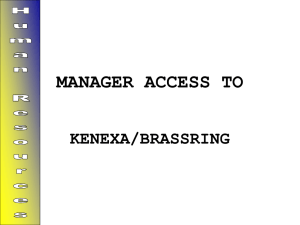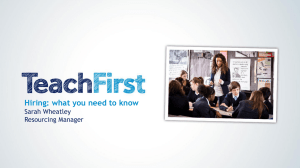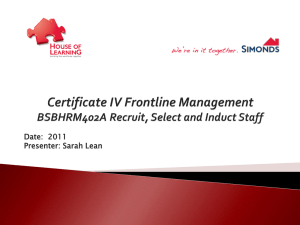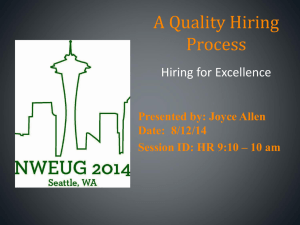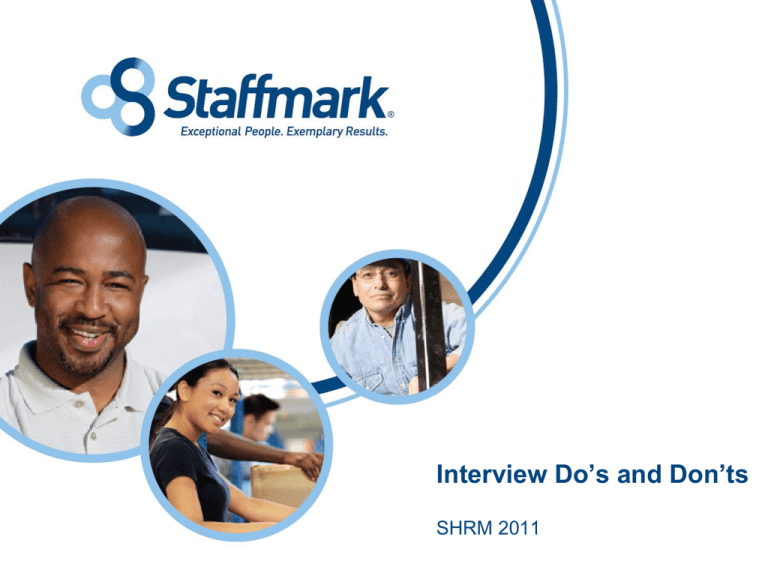
Interview Do’s and Don’ts
SHRM 2011
● Hiring good employees
is the foundation of any
successful business!!
● So how can I be
successful at it ???
2
Why is effective interviewing important?
What happens when you effectively
interview?
What happens when you do not
effectively interview?
Select the right person for the job
Don’t select the right person for the job
Enhance company creditability with
those candidates who were not hired
Lose creditability with those candidates
whom you did not hire
Avoid legal/behavior issues
May have legal/behavior issues
3
Be Prepared
●
Create a suitable environment for your interview
o
o
o
Best case is to forward your phone and inform your staff you are in an
interview and need an hour of not being interrupted.
Be on time
Ensure privacy
●
Prior to the interview take a few minutes to review the candidates
resume/application and learn a little about your candidate and take some
notes.
●
Greet and put the applicant at ease with a solid hand shake.
●
Provide the applicant with an overview of the interview structure
o
o
o
Let them know there will be a discussion of previous experience.
Time of interview process and any testing to be conducted
There will be time at the end for final questions, but to ask questions during
the interview as well.
4
Starting the Interview
●
Don't conduct an “interview”, have a conversation.
o One of the biggest mistake people make in the
interview setting is to conduct it like it appears in a
magazine (question and answer). Don't make that
mistake. Forget about the questions and just have a
comfortable conversation. Keyword: comfortable.
●
Do your homework.
o The only way to avoid getting stuck asking questions is
to do so much research that you don't need them.
Know your subject, know the issues and know what the
public would want to know if they could sit down with
the subject matter.
●
Don't stick to your agenda.
o To make matters worse, most interviewers follow the
questions that they have lined up in the order they
wrote them, instead of letting it flow based on what the
subject is saying. I've seen many great follow-up
conversations and side-tracks lost because the
interviewer was following their flow instead of the flow
of the conversation.
5
Starting the Interview
●
Open Arms.
• Do your best to have nothing blocking you from your
subject matter. This includes objects like recorders, pens,
coffee tables, etc...
●
Have notes prepared.
• It's ok to have some notes about concepts you would like to
discuss, but don't hold it in your hand and look down at it that will break the conversation and turn it into a typical
interview.
• Ask open ended questions. Always start your questions or
commentary with words like "how" and "why". Those two
words can never be responded to with the words, "yes" or
"no". If you want something more than one or two word
answers, use words like "how" and "why".
6
Danger! Danger! Danger!
Keeping it Legal
● The interview process is subject to numerous employment laws
designed to protect applicants' privacy and ensure them a fair
shot in the selection process. ,
● Employers cannot ask questions about religion, national origin,
age, height, weight, marital status, disability, or gender unless
they represent genuine qualifications essential to the operation
of the business. (For example: a church can ask potential
ministers about their religious background; a contracting firm can
ask if candidates are physically able to perform certain tasks.)
● Compliance with laws such as ADA also can become involved in
the interview process.
7
Title VII
● Title VII prohibits discrimination on the basis of
race, color, religion, sex, pregnancy or national
origin.
● Title VII applies to all employers who are engaged
in interstate commerce and have 15 or more
employees.
● Remedies
o Back Pay
o Front Pay
o Attorney’s Fees
o Compensatory and Punitive Damages
● Injunctive Relief
8
Disparate Impact
● Disparate treatment refers to a discriminatory
situation where one individual is treated differently
than similarly situated individuals (usually because
of that individual’s race, sex, religion, age, etc.)
with regard to a term or condition of employment
● Disparate impact discrimination occurs when a
company has a policy or procedure which is
neutral on its face, but which has an adverse
affect on individuals in a protected category
9
Arkansas Civil Rights Act
● Generally follows Title VII
● Allows suits to be brought in Arkansas
state court rather than federal courts
10
ADEA
(Age Discrimination in Employment Act)
● The ADEA prohibits discrimination on the basis of
age. It applies to individuals 40 years of age and
older.
● The ADEA applies to employers engaged in
interstate commerce with 20 or more employees.
● Under this Act, it is unlawful to force an employee
to retire, and it is also unlawful to give preference
because of age to one person over another, even if
they are both in the protected age group.
11
ADA
(Americans With Disabilities Act)
● The ADA prohibits discrimination in employment against
a qualified individual with a disability who is able to
perform the essential functions of the job, with or without
a reasonable accommodation.
● An individual who poses a direct threat to the safety of
himself or others is NOT covered under the Act.
● Current users of illegal drugs are specifically exempted
from the ADA. However, an individual who has
successfully completed drug rehabilitation, or is
undergoing drug rehabilitation, is considered to be
“disabled” under the ADA.
12
“Qualified Individuals” with a Disability
● The individual must meet the prerequisites of the
job (i.e., education level, certified or licensed in a
particular area, etc.) and be able to perform the
essential functions of the job.
● Courts will give deference to a company’s job
description in determining the essential functions
of a job.
13
Reasonable Accommodation
● A reasonable accommodation is an action which an
employer must take that would allow a disabled person
to perform essential functions of the job despite the
individual’s disability.
● Examples:
o
o
o
o
Modifying existing facilities or equipment;
Altering work schedules;
Eliminating non-essential elements of the job; and
Reassigning an individual to a vacant position.
● An employer must make accommodation unless it would
create an undue hardship on the employer.
14
Attendance
● Attendance is an essential job function
15
Workers’ Compensation History Inquiries
• NO before conditional offer of employment
• YES after conditional offer if in the context of
medical exam/inquiry required of all applicants
in same job category
16
USERRA (Uniformed Services Employment
and Reemployment Rights Act)
● Service members have the right to be reemployed in their
civilian job if they meet certain requirements
o 5 year cap, honorable discharge
● Additional discrimination protections for service members:
o
o
o
o
Employers may not deny employment
Employers may not deny reemployment
Employer may not deny retention in employment
Employers may not deny promotion; or any other benefit of
employment
● Also contains certain health insurance protections for service
members
● Includes reserves!
17
Interviewing:
What Should Supervisors Know?
● Should you have front line supervisors involved in
the interview process?
o Gives the supervisor input on the members of their team
o Supervisor is invested in recruitment
o Potential employee gets to meet their boss
● What role should they play?
● If you decide to do it, you should do it for all
supervisors at the same level within your
organization
18
How can I ask the question I need to and stay
within the law?
DO ASK
Don’t ASK
Sex and/or
Family Arrangements
● If the candidate has
relatives already employed
by the company
● Sex of candidate
● Material status
● Number of children or child
care arrangements
● Health care coverage
through spouse?
Race
● No acceptable question
● Candidate’s race or color of
skin
● Request a photo with
application or resume
National Origin
or Ancestry
● If the candidate has a legal
right to work in the Untied
States
● To confirm the ability to
peak or write fluently in
English( if required by the
job)
● Ethnic association of an
candidates surname
● Birthplace of a candidate,
their parents or spouse
● Nationality, lineage, or
national origin
● Whether the candidate is a
citizen of another country
● Native tongue
● Maiden name
Category
How can I ask the question I need to and stay
within the law?
DO ASK
Don’t ASK
Religion
● If the candidate can work
the hours required by the
position
● Candidate’s religious
affiliation
AGE
● If the candidate is at least
18 years of age
● Candidate’s date of birth
● Date of high school
graduation
● Age
Disability
● If the candidate can
perform the essential
functions of the job
● If the candidate has a
disability
● The nature of or the
severity of a disability
● Whether the candidate has
ever filed a Workers
Compensation claim
● Recent or past surgeries
● Past medical Problems
Category
How can I ask the question I need to and stay
within the law?
Category
Other
DO ASK
Don’t ASK
● Convictions ( if job related
or company hiring criteria
● Academic, vocational or
professional schooling
● Training received in the
military
● Membership in any trade or
professional organizations
● Job references
● The number and types of
arrests the candidate has
● The height or weight of a
candidate
● Veteran status, discharge
status or branch of service
● A contact in case of
emergency ( wait until after
a job offer is made)
During the Interview
●
●
●
●
●
●
Don’t be afraid of silence
Take notes consistently through out the interview. Focus on
documenting actions and outcomes rather than trying to capture every
word the candidate says.
Ask at least two open ended questions in each performance skill you are
looking for.
Control the Interview. Guide the applicant to discuss information that
achieves your information gathering objectives
Maintain an 80/20 talk ratio ( You should only do 20% of the talking)
Be aware of the applicant’s communication skills both verbal and nonverbal
22
Behavioral Interviewing
● Definition
o Interviewing process that encourages candidates to discuss
specific past experiences and accomplishments.
● Purpose
o Based on the theory that past behavior predicts future
behavior
23
Trait vs. Behavior
●
●
Trait: A word use to summarize a
person’s characteristics
Trait-Based
Behavior-Based
Traits become labels
Behavioral descriptions
discourage stereotypes
Weak link between data and
prediction
Prediction is directly
related to data
All candidates try to sound
good
“Stories” make it difficult
to fake success
Avoiding true skills
Candidates with a variety
of skills are identified
Behavior: Anything a person does
that can be observed or measured
24
Behavioral Interview Model
Read an
open-ended
question
Seek contrary
information
Allow silence
Probe for
clarification
Gain a behavioral
example
Take notes as
you listen
25
Tolerate Silence
● For most candidates, up to 10 seconds of silence is productive
● After about 15 seconds, the tension may become destructive
26
Tolerate Silence
● Tips
o Add to your notes
o After 10 seconds: “It’s ok to take your time.”
o Rephrase the question
o Avoid trying to answer or give examples
o Make more specific to their experience
Quality information drives quality decisions
27
Using Open-Ended Questions
Closed-Ended
Open-Ended
“Are you attentive to detail?”
“Tell me about a time when being attentive to the
details of the job or task paid off.”
“Are you willing to work hard?”
“Give me an example of a time when you had to
put forth a lot of extra time and effort to reach a
deadline.”
“Are you able to adjust to changes?”
“How do you go about adjusting to some major
changes in your job or organization.”
28
Sample Behavior-Based Questions
● If you're looking for leadership: "Tell me about a time when
you accomplished something significant that wouldn't have
happened if you hadn't been there to make it happen."
● If you're looking for communication: "Describe a situation
where you persuaded team members to do things your way.
What was the effect?"
● If you're looking for customer service: "Tell me about a time
when you had to deal with an irate customer
29
Decision Making and Problem Solving
● Describe a situation when your judgment and common sense
played a major role in solving an important problem and work.
● Tell me about a time when you used a systematic approach in
problem solving.
● When has your ability to determine the potential causes of a
problem enabled you to put an effective solution into action?
30
Probing
● Gain specifics
● Clarify understanding
● Target the skill definition
● Focus on an idea
31
Seeking Contrary Information
● With a negative gut feeling, try to find evidence to the contrary
● With positive gut feeling, look for areas of improvement
● Use supportive words to give permission to admit a mistake
● Recognize when a candidate does give a negative response; do
not automatically discount the candidate’s skill
32
Seeking Contrary Information
● “Describe a time when you lost your temper with a difficult
customer and compromised the level of service provided.”
● “Tell me a time when you disappointed yourself with regard to
your performance.”
● “Describe a time when you provided a high level of service to a
difficult customer.”
33
Evaluating Responses
● Recent: How long ago did the example take place?
● Multiple: How many examples support the evidence of the skill being
present?
● Consistency: Is there consistency over time of the behaviors?
34
Closing the Interview
● Thank the applicant for participating in the interview process
● Ask the applicant if they have any questions regarding the
position or the company
● Communicate the next steps in the process
● Hand the applicant your business card and escort them out of
the office
35
Documentation
● Helps you remember
● Helps you make fair decisions—ask candidates same or similar
questions for comparison
● Protects you in case of legal actions
Take notes that reflect exactly what the candidate said to help you
rate skills. Avoid writing interpretations or general impressions.
36
Evaluating all the Candidate and the
Responses
● Related: How related or relevant are the examples to the skill being
examined?
● Role: Is the candidate’s role clear?
● Depth: Is there adequate detail supporting the examples he or she
gave?
● How did the candidate dress?
● Was the candidate on time?
● Did they do their homework-research your company?
● Did they show Enthusiasm for the job
● Did they Listen
● Ask Question/show interest
37
Open Discussion/
Questions


